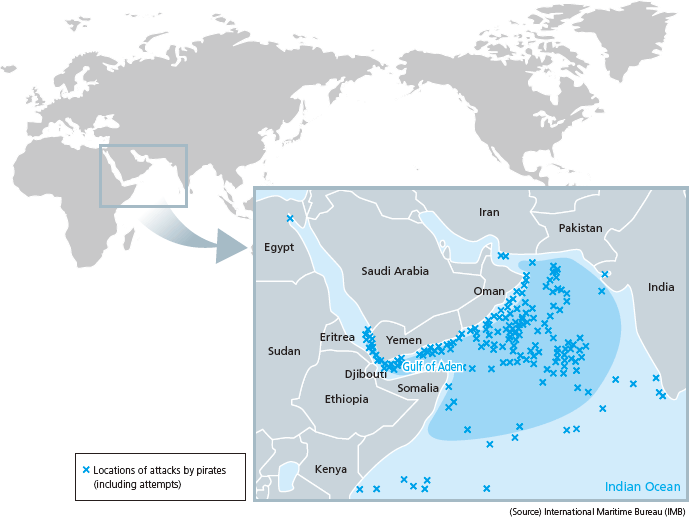Japan's Official Development Assistance White Paper 2011
(6) Transnational Crime and Terrorism
With globalization and the progress of high-tech devices, and the increased movement of individuals, transnational organized crime and terrorist activities have become threats to the entire international community. International organized crime, including the illicit trade of narcotics and firearms, illegal immigration, trafficking in women and children, smuggling of cash, forgery of currencies, and money laundering*, has become increasingly diverse and sophisticated in its methods in recent years. In spite of the death of Al Qaida leader Usama bin Laden, the international terrorist organization’s force can still not be taken lightly. In particular, extremist activities conducted by affiliated organizations that have been influenced by the ideas and methods of terrorism of Al Qaida have become new threats. There are limitations for a single country to respond to transnational organized crime and terrorist activities that continue across borders. Therefore, in addition to strengthening the measures implemented by each country, it is necessary for the entire international community to eliminate all legal loopholes through efforts such as assistance for capacity building to handle criminal justice and law enforcement in developing countries.
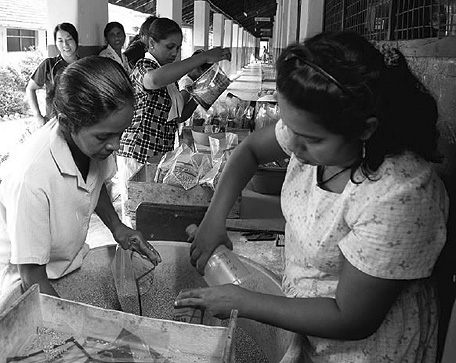
Sri Lanka's only women's correctional facility, where a Japan Overseas Cooperation Volunteer serves. Petty offenders convicted of crimes related to prostitution, narcotics, etc., as well as vagrants, are housed there and receive vocational training. (Photo: Shinichi Kuno/JICA)
<Japan's Efforts>
•Narcotic Drugs
In addition to participating proactively in international meetings of the United Nations Commission on Narcotic Drugs, Japan contributes to the United Nations International Drug Control Programme (UNDCP) Fund of the United Nations Office on Drugs and Crime (UNODC) to provide assistance to developing countries, particularly in Asia. In FY2010, Japan used a contribution of approximately $1.38 million to the UNDCP fund for projects that included monitoring the illegal cultivation of poppies (a plant used as an ingredient for the narcotic opium) and investigation of the manufacturing of illegal synthetic drugs in Myanmar, projects related to the drug control in Southeast Asia and the Pacific region, and support for the creation of plans for the drug control in Laos. Also through the United Nations Asian and Far East Institute for the Prevention of Crime and the Treatment of Offenders (UNAFEI) Japan supported the trainings for treatment of drug-dependent offenders.
•Against Trafficking in Persons and Corruption
In FY2010, Japan contributed $90,000 to the Crime Prevention and Criminal Justice Fund (CPCJF) of the UNODC. In addition, in August 2011, Japan decided to extend assistance totaling $2.36 million through the UN Trust Fund for Human Security which Japan had taken the lead in founding to a project entitled "Protecting and Empowering victims of trafficking in Indonesia" which is going to be implemented by the International Organization for Migration (IOM) and other organizations.
Against trafficking in persons, Japan is focusing on supports of palliative care (psychological care through art therapy and other methods) and the social reintegration of victims. In the past, Japan has utilized donations to the CPCJF to implement projects for measures against trafficking in persons in Pattaya, Thailand (protection of children from trafficking in persons and sexual exploitation). Japan also provides the Philippines National Police to develop Standard Operating Procedures for the investigation of trafficking in persons in the Philippines. Japan is considering support focused on Southeast Asia in the future as well. Further, Japan provides assistance through the IOM for the safe repatriation of victims and their reintegration in their home countries, who are under protection in Japan. Moreover, Japan provides support for the Bali Process, which is a framework of illegal immigration, trafficking in persons, and transnational crime in the Asia-Pacific region.
As part of its efforts against corruption, Japan utilized contributions to the CPCJF to support for hosting seminars on corruption prevention measures in Vietnam. This contributed to the strengthening of initiatives to combat corruption in Vietnam, which is also a recipient of ODA from Japan. Japan is currently holding discussions with the UNODC regarding the implementation of similar seminars in other countries in Southeast Asia in the future.
Through the UNAFEI training courses and seminars have been held for criminal justice professionals from developing countries mainly in the Asia-Pacific region and other regions. Topics included protection of witnesses and whistle-blowers prevention of corruption. Each of the topics is a priority issue stipulated in the Convention against Transnational Organized Crime and the United Nations Convention against Corruption. These efforts contribute to the sound development of criminal justice and the strengthening of cooperative relationships in each country.
•Counter-Terrorism
Efforts must be made to prevent methods of terrorism and safe havens from falling into the hands of terrorists, and to overcome vulnerabilities to terrorism. Japan provides assistance to developing countries that do not necessarily have sufficient capacity to counter terrorism in order to improve their counter-terrorism capabilities. In particular, Japan established Grant Aid for Cooperation on Counter-terrorism and Security Enhancement in 2006, and since that time has utilized such aid to support measures against terrorism in developing countries.
It is important to prevent terrorism and ensure safety in Southeast Asia, which has especially close ties to Japan, so Japan has placed extra emphasis on support for those efforts. Specifically, Japan provides equipment, dispatches experts, hosts seminars, and accepts trainees in the areas of immigration control, aviation security, port and maritime security, customs cooperation, export control, law enforcement cooperation, combating terrorist financing,(Note 16) international counter-terrorism conventions and protocols, etc.
For example, Japan has hosted the Seminar on Immigration Control every year between FY 1987 and 2010, inviting officials in charge of the immigration control authorities of various Southeast Asian countries, to strengthen mutual understanding and partnership through the sharing of information and ideas. The seminar also improves the capabilities of immigration control personnel in each country.
In February 2011, Japan held a seminar for officials dealing counter-terrorism from South Asian countries to deepen understanding of international counter-terrorism conventions and protocols and to promote accession to them. In addition, in FY2010, Japan contributed approximately $48,000 to the UNODC Terrorism Prevention Branch to support the establishment of counter-terrorism lawsin Indonesia and other ASEAN countries. Further, in January 2011, Japan contributed $1.75 million to the UNODC Terrorism Prevention Branch for counter-terrorism in Afghanistan and neighboring countries.
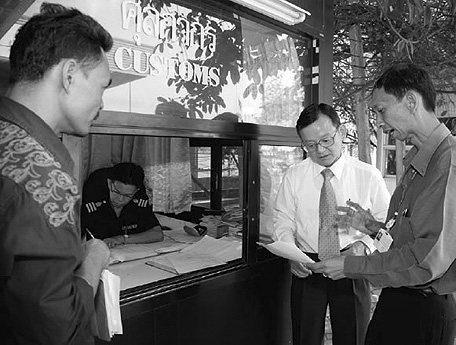
A Japanese expert and Thai customs staff members confirm procedures for customs clearance work at a customs office on the Mekong side of the Friendship Bridge that connects Thailand and Laos as part of the "Regional Cooperation Project on Risk Management for Customs in the Mekong Region" in Thailand. (Photo: Shinichi Kuno/JICA)
•Measures against piracy
Japan is a maritime nation that depends largely on maritime transport for the import of energy and food resources and trade. Measures of ensuring the safety of maritime navigation, such as measures against terrorism and piracy, are issues that have a direct link to Japan's prosperity and existence as a nation. Furthermore, the security of sea lanes is extremely important for the economic development of the region. In recent years, many acts of piracy have occurred in the Gulf of Aden and off the coast of Somalia in eastern Africa. Although the efforts of the international community have yielded a certain degree of results, the number of acts of piracy in 2010 amounts to 219, and the area where acts of piracy occur has expanded from the coast of Somalia and the Gulf of Aden to the whole western part of the Indian Ocean., Piracy is becoming a significant threat to the maritime navigation.
In order to counter these threats, Japan is deploying two destroyers and two P-3C maritime patrol aircraft of Maritime Self-Defense Force to the area off the coast of Somalia and in the Gulf of Aden to conduct counter-piracy activities in accordance with the Anti-piracy Measures Law enacted in June 2009. On board the destroyers are officers of the Japan Coast Guard, so that they can carry out law enforcement activities like criminal investigation and arrest in case of piracy attacks.
In order to solve the issue of piracy off the coast of Somalia, it is necessary to conduct anti-piracy multilayered measures, including enhancing maritime law enforcement capacity of the countries around Somalia and stabilizing the unstable situation in Somalia, which are in the background of increased damage from piracy. As a part of these efforts, Japan took the initiative in establishing a fund in the International Maritime Organization (IMO (Note 17)) and contributed $14.6 million to the fund to support the construction of an anti-piracy training center and the establishment of the information sharing centers in the countries around Somalia, and other related efforts.
Japan has also contributed a total of $1.5 million to the Trust Fund to support initiatives of States Countering Piracy off the Coast of Somalia managed by the UNODC, that facilitates prosecution of suspected pirates. In addition, JICA together with Japan Coast Guard has carried out training programs for the control of maritime crime, inviting to maritime security officers from the countries around Somalia. Since 2007, Japan has disbursed approximately $184 million to Somalia in assistance to strengthen domestic security, provide humanitarian aid, and establish the infrastructure.
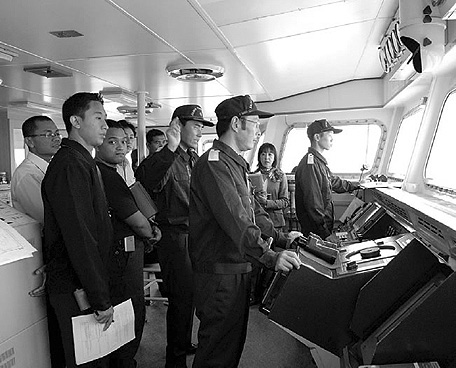
Maritime security organization and coast guard members from Asia and the Middle East receive training from Japanese Coast Guard officers in the pilothouse of a patrol vessel as part of the trainging "Maritime Law Enforcement for Asia and Middle East," implemented with the cooperation of the Japan Coast Guard (Photo: JICA)
Terminology
*Money laundering
Money laundering refers to the act of disguising funds or proceeds obtained from criminal activities as legally obtained assets, or the act of hiding such funds. Example) A drug dealer opens a bank account under a false name and hides money obtained through drug transactions in that account.
Notes:
(16) Measures against the flow of funds to terrorists and terrorist organizations.
(17) On January 1, 2012, former IMO Maritime Safety Division Director Koji Sekimizu was elected as IMO Secretary-General.
[Philippines]
"Philippine Coast Guard Education and Human Resource Management System Development Project"
Technical Cooperation Project (January 2008 - Current)
The Philippines is an island nation surrounded by the ocean like Japan, so one of its major modes of transportation is ocean transport. However, every year there are many sea accidents caused by natural and man-made disaster. In addition, since the coast guard system is insufficient, these accidents cause an extremely high number of deaths and missing persons, as well as environmental pollution by oil leaks of tankers, smuggling and illegal behavior, and terrorism and piracy. Due to these circumstances, in cooperation with the Japan Coast Guard Japan has provided technical cooperation to support the Philippine Coast Guard in its response to a variety of issues. Japan has been working to support for the establishment of an education and training system which is based on the outcome of the cooperation Japan has provided in the past, so that the Philippine Coast Guard can develop necessary human resources on its own.
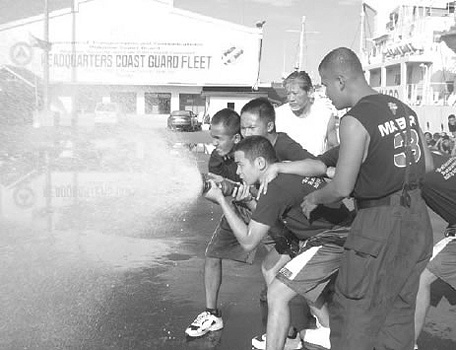
Fire extinguishing training (Photo: JICA)
Ocean areas with frequent piracy
